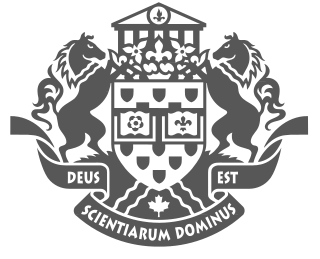
The University of Ottawa, often referred to as uOttawa or U of O, is a bilingual public research university in Ottawa, Ontario, Canada. The main campus is located on 42.5 hectares in the heart of Ottawa's Downtown Core, adjacent to the residential neighbourhood of Sandy Hill, adjacent to Ottawa's Rideau Canal.

Education in Canada is for the most part provided publicly, and is funded and overseen by provincial, territorial and local governments. Education is within provincial jurisdiction and the curriculum is overseen by the province. Education in Canada is generally divided into primary education, followed by secondary education and post-secondary. Within the provinces under the ministry of education, there are district school boards administering the educational programs.
The New Reform Party of Ontario was a minor provincial political party in Ontario, Canada, that promoted a populist, fiscally conservative, socially conservative, libertarian, and localist ideology.

Student voice is the individual and collective perspective and actions of students within the context of learning and education. It is identified in schools as both a metaphorical practice and as a pragmatic concern. Tech educator Dennis Harper noted that student voice gives students "the ability to influence learning to include policies, programs, contexts and principles."

The Ontario Disability Support Program (ODSP) is a means-tested government-funded last resort income support paid for qualifying residents in the province of Ontario, Canada, who are above the age of 18 and have a disability. ODSP and Ontario Works (OW) are the two main components of Ontario's social assistance system. Like most social programs in Canada, the program is funded by the government of the province. The Ministry of Community and Social Services is responsible for ODSP and OW.
The Mental Health Commission of Canada (MHCC) is a national non-profit organization created by the Canadian government in 2007 in response to a senate committee tasked to study mental health, mental illness, and addiction. The committee appointed Michael J. L. Kirby as the first chairperson. The MHCC was endorsed by all the provinces and territories with exception to Quebec. The Commission is funded by Health Canada and has a ten-year mandate enforced through a sunset clause. On 21 April 2015, Minister of Finance Joe Oliver announced that the 2015 federal budget calls for the renewal of the MHCC for another ten-year mandate starting in 2017-2018.
Employment equity, as defined in federal Canadian law by the Employment Equity Act, requires federal jurisdiction employers to engage in proactive employment practices to increase the representation of four designated groups: women, people with disabilities, Aboriginal peoples, and visible minorities. The act states that "employment equity means more than treating persons the same way but also requires special measures and the accommodation of differences".

Social programs in Canada include all Canadian government programs designed to give assistance to citizens outside of what the market provides. The Canadian social safety net includes a broad spectrum of programs, many of which are run by the provinces and territories. Canada also has a wide range of government transfer payments to individuals, which totaled $176.6 billion in 2009—this cost only includes social programs that administer funds to individuals; programs such as medicare and public education are additional costs.
Poverty in Canada refers to the state or condition in which a person or household lacks essential resources—financial or otherwise—to maintain a modest standard of living in their community.
A business–education partnership is an agreement of collaboration between schools and businesses, unions, governments or community organizations. These partnerships are established by agreement between two or more parties to establish goals, and to construct a plan of action for achievement of those goals.
Somali Canadians are Canadians of Somali origin or are dual Somali and Canadian nationality.

Higher education in Canada includes provincial, territorial, indigenous and military higher education systems.
The Canadian federal budget for the 2009-2010 fiscal year was presented to the House of Commons of Canada by Finance Minister Jim Flaherty on January 27, 2009. The federal budget included $40 billion in stimulus and $20 billion in personal income tax cuts.
The Office of Social Innovation and Civic Participation was an office new to the Obama Administration, created within the White House, to catalyze new and innovative ways of encouraging government to do business differently. Its first director was the economist Sonal Shah. The final director was David Wilkinson.

A social impact bond, also known as pay-for-success financing, pay-for-success bond, social benefit bond or simply a social bond, is one form of outcomes-based contracting. Although there is no single agreed definition of social impact bonds, most definitions understand them as a partnership aimed at improving the social outcomes for a specific group of citizens. The term was originally coined by Geoff Mulgan, chief executive of the Young Foundation. The first SIB was launched by UK-based Social Finance Ltd. in September 2010.
Universal basic income in Canada refers to the debate and trials with basic income, negative income and related welfare systems in Canada. The debate goes back to the 1930s when the social credit movement had ideas around those lines. Two major basic income experiments have been conducted in Canada. Firstly the Mincome experiment in Manitoba 1974–1979, and secondly the Ontario Basic Income Pilot Project in 2017. The latter was intended to last for three years but only lasted a few months due to its subsequent cancellation by the then newly-elected Conservative government.
The Community Futures Network of Canada is an extensive network of 269 community futures development corporations. The national Community Futures Program is administered by four regional development agencies, the Atlantic Canada Opportunities Agency (ACOA), Canadian Economic Development for Québec Regions (CED-Q), Western Economic Diversification Canada (WD), and the Federal Economic Development Initiative for Northern Ontario (FedNor) under Industry Canada (IC). In Western Canada the Community Futures Program is delivered through a network of 90 non-profit organizations that are supported by four associations and one Pan-West Community Futures Network.
Open educational resources in Canada are the various initiatives related to open education, open educational resources (OER), open pedagogies (OEP), open educational practices (OEP), and open scholarship that are established nationally and provincially across Canadian K-12 and higher education sectors, and where Canadian based inititatives extend to international collaborations.

Kwame Julius McKenzie is a British-Canadian psychiatrist employed as the CEO of Wellesley Institute, a policy think tank based in Toronto, Ontario. Born in the United Kingdom, McKenzie is a physician and full professor in the Department of Psychiatry at the University of Toronto. He has worked as physician, researcher, policy advisor, journalist and broadcaster.








